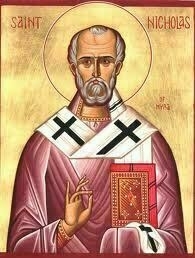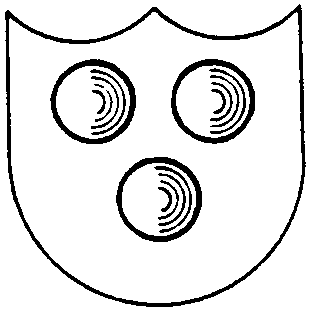unstealing
∞
who was the orphaned son of wealthy parents. One day he overheard a father lamenting that he had to sell one of his three daughters into slavery in order for the rest of the family to survive. That night Nicholas threw some coins into the family's window to ensure the liberty of the girl, and returned the next two nights to repeat the gift on behalf of the other two girls. This is why the symbol of St. Nicholas is often three coins:
He wanted his gift to be done in secret, perhaps so that he knew he wasn't giving in order to receive gratitude and honor. I have come to think of this as the reverse of stealing, a secret giving or an "un-stealing."
Once, while I was teaching at Penn State, a student told me he was weighing an invitation to join a secret society. Some aspects of the society were appealing - friendship, loyalty, and a shared purpose, for instance - but he did not feel wholly comfortable with the idea. I suggested then (and have suggested to several others since) that they consider forming a secret society that was not inwardly-focused but outwardly-focused. They could call it the "St. Nicholas Society." Its purpose would be to do good in the world without seeking to receive anything in return.
Of course, I have no idea if any of them have formed a St. Nicholas Society. If they have, they have been successful at keeping it secret, at least from me! And you have no idea if I've formed one, or if I just like to talk about it to others.
St. Nicholas Society and "un-stealing"
I just read an article about German Catholics wanting a Santa Claus-free Christmas this year. It reminds me of something I have often spoken to students about: creating a “St. Nicholas Society.” The idea comes from the legend of the young St. Nicholas,
who was the orphaned son of wealthy parents. One day he overheard a father lamenting that he had to sell one of his three daughters into slavery in order for the rest of the family to survive. That night Nicholas threw some coins into the family's window to ensure the liberty of the girl, and returned the next two nights to repeat the gift on behalf of the other two girls. This is why the symbol of St. Nicholas is often three coins:
He wanted his gift to be done in secret, perhaps so that he knew he wasn't giving in order to receive gratitude and honor. I have come to think of this as the reverse of stealing, a secret giving or an "un-stealing."
Once, while I was teaching at Penn State, a student told me he was weighing an invitation to join a secret society. Some aspects of the society were appealing - friendship, loyalty, and a shared purpose, for instance - but he did not feel wholly comfortable with the idea. I suggested then (and have suggested to several others since) that they consider forming a secret society that was not inwardly-focused but outwardly-focused. They could call it the "St. Nicholas Society." Its purpose would be to do good in the world without seeking to receive anything in return.
Of course, I have no idea if any of them have formed a St. Nicholas Society. If they have, they have been successful at keeping it secret, at least from me! And you have no idea if I've formed one, or if I just like to talk about it to others.

